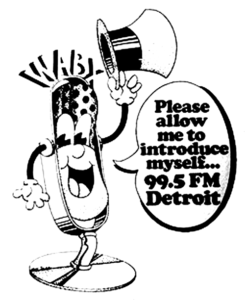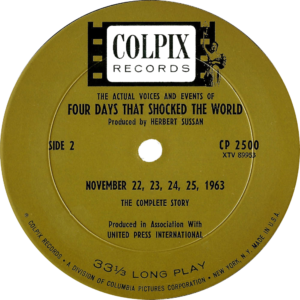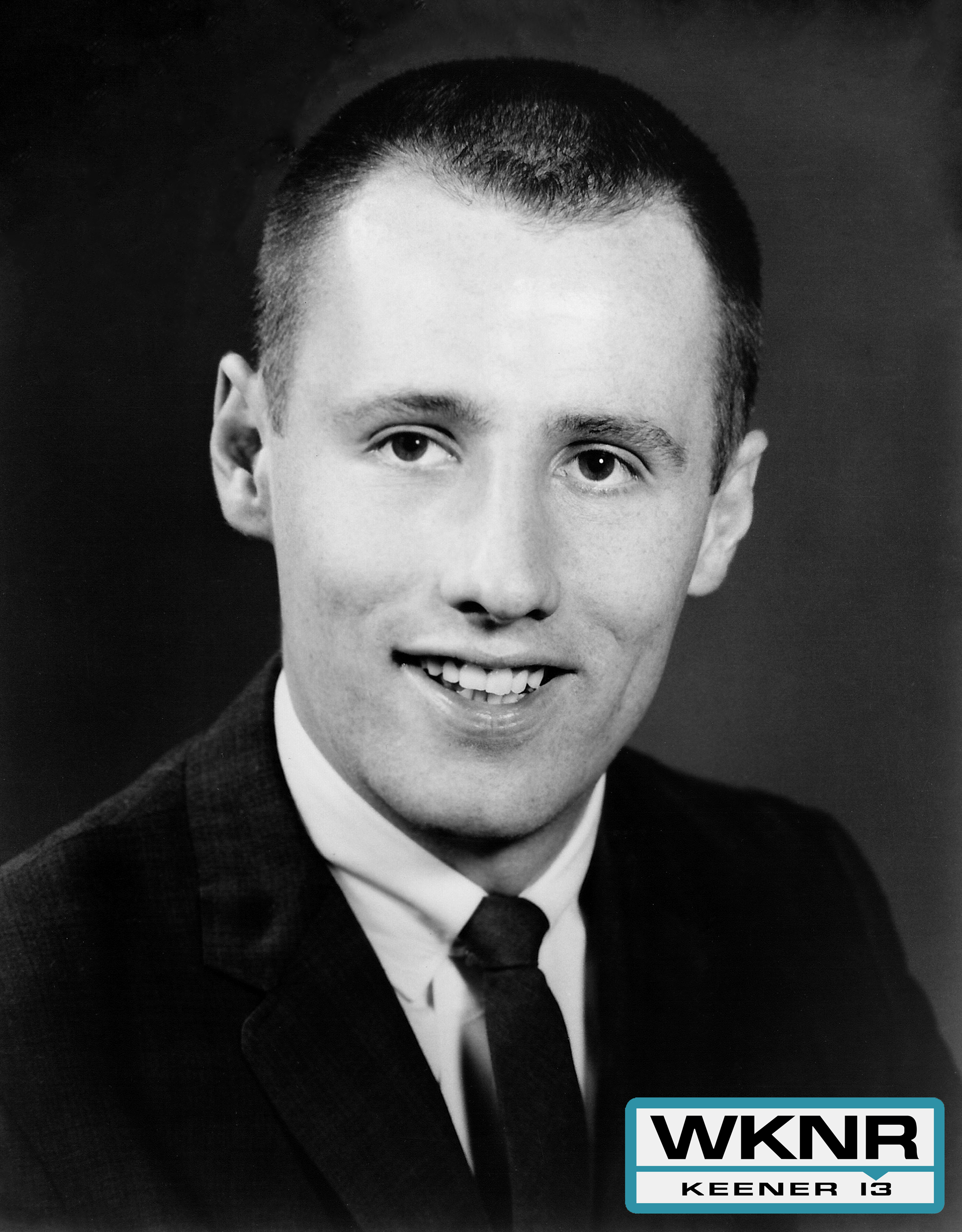— THE BEATLES —
Debuted #69 week-ending January 25, 1964, 3 weeks playing the Billboard Singles chart, “She Loves You” climbs to #7, this week, February 2 through (week-ending) February 8, 1964.
![]()
_______________
 The station began broadcasting on May 4, 1960, as WABX, beginning as a classical music station before adopting the MOR format in 1964. For a short period beginning in August 1967, the station adopted an all-girl jock policy during the day, playing jazz-oriented pop music and humorous bits. The idea came from Mickey Shorr, who was program manager and creative director of Century Broadcasting Corp., the station’s then-owner.
The station began broadcasting on May 4, 1960, as WABX, beginning as a classical music station before adopting the MOR format in 1964. For a short period beginning in August 1967, the station adopted an all-girl jock policy during the day, playing jazz-oriented pop music and humorous bits. The idea came from Mickey Shorr, who was program manager and creative director of Century Broadcasting Corp., the station’s then-owner.
During the Fall of 1967, WABX began airing a new music show called “Troubadour” from seven to eight in the evening, hosted by station manager John Small. The show featured blues, folk, and rock music. During this time, WABX was still airing an MOR format, with an emphasis on up-tempo music from artists like Mel Tormé, Frank Sinatra, Nancy Wilson, and Joe Williams.
The strong, positive response generated by “Troubadour” was enough to convince the station’s owners to adopt a full-time progressive rock format. On February 1, 1968, “play lists” of acceptable tunes went out: the DJs picked their own music, and Century Broadcasting Corporation bit its tongue. With a free form progressive rock format, WABX became a springboard for the new music that no other station in the market (least of all CKLW and the other Top 40 stations) would touch.
The format, once having been branded in the media as an “aural absurdity”, the  ABX revolution was one of style as well as sound. The station made itself a community catalyst for fun: free concerts and movies, kite-flys, bike-ins, and conferences.
ABX revolution was one of style as well as sound. The station made itself a community catalyst for fun: free concerts and movies, kite-flys, bike-ins, and conferences.
Also, the station played a role in giving many artists the recognition that they did not have at the time, including The Doors, Jimi Hendrix, Cream, Iron Butterfly, and The J. Geils Band. The success of WABX inspired other Detroit stations such as WKNR-FM and WXYZ-FM to adopt the progressive-rock approach. “Air Ace” Dave Dixon was a musician himself who co-wrote the Peter, Paul and Mary hit “I Dig Rock and Roll Music.”
During the 1970s, WABX evolved into a more mainstream album oriented rock station, albeit one that took a softer, more laid-back approach than its competitors.
The station was branded as “WABX 99” during this era with a logo similar to the one used by the current WABX in Evansville, Indiana, featuring yellow lettering on a black background. The station’s studio also moved from its original location in the David Stott Building in downtown Detroit to a new facility in suburban Oak Park during this period.
By 1982, WABX was third-ranked out of three AOR stations in Detroit (behind WRIF and WLLZ). Century Broadcasting sold the station to Liggett Broadcasting that year. Under new program director Paul Christy, WABX shifted from AOR to “Hot Rock,” a Top 40/rock hybrid (known on the air as “Detroit’s New Music“), playing a wide variety of new wave, pop, rock and urban product with a slick, CHR-style presentation.
However, the station’s market share continued to decline throughout 1983, and a little over a year after WABX debuted “Hot Rock,” Liggett decided to change the station’s format and calls.
On January 9, 1984, WABX’s long-term reign as a high-rolling rock station came to an end with the song “When the Music’s Over” by The Doors, after which the station became “Class FM“, WCLS, with a soft rock format. However, the adult contemporary field in Detroit was as crowded as the rock format had become, and “Class FM” was not successful. At this same time, the station was sold to Metropolis Broadcasting.
_______________
Source: WABX; Wikipedia
![]()
_______________
FIFTEEN WEEKS on the singles chart, “I Want To Hold Your Hand” by The Beatles peaked at #1 this week (7 weeks overall) on the Billboard Hot 100. Week ending, February 1 through week ending March 14, 1964. (Source: Billboard)
For our previous Billboard 1964 Number One U.S.A. Hits go HERE
![]()
_______________
THIRTEEN WEEKS on the singles chart, “There! I’ve Said It Again” by Bobby Vinton peaked at #1 this month (4 weeks overall) on the Billboard Hot 100. Week ending, January 4 (through week ending) January 25, 1964. (Source: Billboard)
For our previous Billboard 1964 Number One U.S.A. Hits go HERE
_______________
![]()
 FOUR DAYS THAT SHOCKED THE WORLD
FOUR DAYS THAT SHOCKED THE WORLD
Colpix Records No. CP 2500 XTV 89953; Released December 1963
 NEW YORK —The monumentally outstanding reportorial job performed by the nation’s broadcasting stations is further documented in Colpix Records’ LP documentary on the assassination of President Kennedy and its aftermath, “Four Days that Shocked the World.”
NEW YORK —The monumentally outstanding reportorial job performed by the nation’s broadcasting stations is further documented in Colpix Records’ LP documentary on the assassination of President Kennedy and its aftermath, “Four Days that Shocked the World.”
The comprehensive chronology begins with the late President’s breakfast speech at Forth Worth and ends with Taps at Arlington.
Featured are excitingly gripping on-the-scene accounts of the swiftly evolving events of those four days provided by United Press International Audio News, Merriman Smith, UPI White House re-porter; William Hampton, Ron Jenkins, Karl King, Sam Pace and Dick Moore of KBOX-Radio’s news department in Dallas; Joseph Long, news director of KLIF, Dallas; Walter Evans, Mel Couch and Pierce Allen, WFAA, Dallas; Nelson Kirk-wood, news director, WIL, St. Louis; William Whelan, news director WNAC, Boston; Lee Hanna, Ike Pappas and Reid Collins of WNEW, New York. Collins wrote and delivered the narration on the documentary LP. END
_______________
NOTE: For more comprehensive information of this historic 1963 album, visit our November 22, 2013 post HERE
_______________
Information and news source: Billboard; January 18, 1964
FOUR DAYS THAT SHOCKED THE WORLD | THE COMPLETE STORY
![]()
J. MICHAEL WILSON | DATE: WEDNESDAY, FEBRUARY 28, 1968
_______________
NEW! A special THANK YOU to our website contributor, Peter Faulkner, of Calgary, Alberta, for donating this WKNR-AM radio aircheck (he personally recorded in 1968) to Motor City Radio Flashbacks.

![]()
_______________
THIRTEEN WEEKS on the singles chart, “ABC” by The Jackson 5 peaked at #1 on May 25 (2 weeks) on the Billboard Hot 100. Week ending April 25 through week ending May 2. (Source: Billboard)
For the COMPLETE 21 Billboard Number One U.S.A. Hits 1970 go HERE
NUMBER 1 IN AMERICA * APRIL 25 -MAY 2, 1970
![]()
_______________
FIFTEEN WEEKS on the singles chart, “Everything Is Beautiful” by Ray Stevens peaked at #1 on May 30 (2 weeks) on the Billboard Hot 100. Week ending May 30 through week ending June 6. (Source: Billboard)
For our previous Billboard Number One U.S.A. Hits 1970 go HERE
NUMBER 1 IN AMERICA * MAY 30-JUNE 6, 1970
![]()